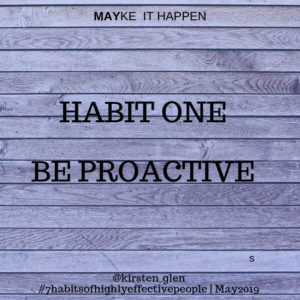
09 May Be Proactive
Seven Habits of Highly Effective Job Seekers
The first motivational or self-help book that I read, over 20 years ago, was “Seven Habits of Highly Effective People” by Stephen Covey, and it changed my life. Not only did it turn me into an avid reader of books that would grow my heart and mind, but it also changed the way that I looked at business.
This month, I started a weekly program of going through these seven habits with my amazing team at RESOURCE recruitment, and it occurred to me, that this is something that every job seeker needs to know too! So each week I will post a blog on “The Seven Habits of Highly Effective Job Seekers”.
HABIT ONE: BE PROACTIVE
Do you ever catch yourself day dreaming; or snap at someone, and know that your behaviour is not right, and possibly you need to walk away until your mood improves? This is because as humans, we are “self-aware”. This means we are aware of our thoughts and feelings. This is a powerful concept because it means that we are not our thoughts or our feelings, and we are not slaves to them either. We have the freedom to choose how we react to the stimuli around us, and the ability to control our emotions and moods.
Being proactive is more than taking initiative, it is about taking responsibility- for our “ability” to “respond”.
Highly proactive people take RESPONSIBILITY for their actions and their lives. They don’t blame circumstances, other people, economic conditions or other people’s opinions. Proactive people are grateful people.
YOUR WORDS HAVE THE POWER TO CHANGE YOUR LIFE
As a job seeker, the first thing that you need to watch is your speech- both what you say to others, and what you say to yourself! Words have a way of being a self-fulfilling prophecy. When you are constantly saying that there are no jobs out there, and you will never get the salary you want- this is exactly what you get. Reactive people also tend to turn “words” into “feeling”. Instead of saying they are “unemployed” in a way that they are now open to new opportunities, have time to help in community projects and are available immediately; they say it in a way that it is an excuse, a title, a description of the sum total of who they are- a victim of circumstance. If you are unemployed- do you say it like you are proactive, or reactive?
For the next week, listen to your language, and that of the people that are around you. As recruiters, we are extremely aware of proactive and reactive language in interviews. Reactive applicants come into the interview with every excuse why jobs have not worked out, why they have not been able to find another job, why they are looking for another job. Their excuses are all about the country, the economy, race, age… everything that they have no control over. Proactive people come into the interview and they focus on what they have to offer- their skills, experience and opportunities they see around themselves. They turn “If only…” into “I will”; “There’s nothing I can do about it.” into “Let’s look at alternatives.”; “I will have to take what I can get”, into “Give me an opportunity and I can grow the position.”
People like positive, proactive, responsible people- so guess who gets the job?
FOCUS ON WHAT YOU CAN CONTROL
The next part of this chapter, that I love and apply every day, is “The Circle of Control and The Circle of Concern”. Everything in life falls into two circles or categories- those things that we can change, and those things that we cannot. Whichever circle you focus on, grows. In the Circle of Concern, we have everything that happened in the past and may happen in the future- you can be concerned about these, but you have no control. Other areas of “concern” are what is happening on social media; other peoples driving skills in the mornings traffic; the outcome of the political elections and the state of the government; which companies are retrenching; the economy and rising cost of living…. Focusing on these areas will get more areas of concern to focus on, and your problems will appear to grow!
In the “Circle of Influence” you have everything that is in your life today. You have control over what books your read; free online courses that you can study to increase your skills; how you spend your free time; the people you surround yourself with; who you vote for; what you spend your money on; what you say; how well your CV is put together and how many people who you have sent it to. And when you focus on your “Circle of Control” you get more in control of your life!
MAKE A COMMITMENT TO BE MORE PROACTIVE
Its easy to say that you need to be proactive, speak positively and only focus on the parts of life you can control, but its hard to keep that up when the realities of life can be overwhelming. Like all things, proactivity is a skill that needs to be learnt and practised. Start each day my making a promise or commitment to yourself to do something- a little things at first and keep that promise. Maybe make the commitment that you will update your CV on a job portal; or review your CV; or send your CV to three people; or read five pages of an uplifting book; or maybe just get out of bed by 8am and go for a walk. Make yourself a promise everyday for 30 days, and keep it, and you will be shocked at the shift in your life at the end of 30 days
Sometimes, the biggest change comes from the smallest of actions. Give it a try!



